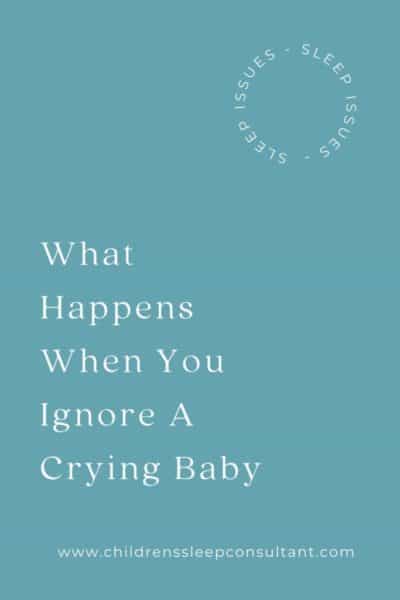What Happens When you Ignore a Crying Baby
When you embark upon the cry it out method of sleep training, you ignore your child’s basic means of communication. So what does that mean? And what potentially happens when you ignore a crying baby?
Your baby cries for a reason. Maybe they’re tired, hungry or cold. Maybe they’re frightened, poorly or anxious. Whatever the reason, their cries are often their only means of communicating with you. When we ignore those cries, we most likely have our reasons. Perhaps we’ve already been up five or six times that night already. Perhaps the book we read suggested leaving them to cry a little longer each night. Perhaps we’ve been led to believe that responding straight away will result in over-dependence and sleepless nights forever. But to the baby, all it means is that their needs are not being met. Your baby doesn’t understand anything more than the fact that they are being ignored- so what does that mean?


For some babies, it means they simply stop trying to communicate. This is often seen as ‘success’ in sleep training, where the strategy is to allow a baby to ‘cry it out’, but in reality, it’s anything but. A baby who gives up trying to communicate has not suddenly learned how to sleep through the night; more likely, they’ve learned that they cannot trust anyone to come to them when they call out. A logical mind will tell you that this method is more likely to increase dependence and hinder your chances of a good night’s sleep in the long run!
But there’s more to it. When a baby cries for a prolonged period of time, the body releases an increased amount of cortisol, the stress hormone. This stress hormone increases feelings of anxiety and can lower growth hormones, which can inhibit the development of nerve tissue in the brain, resulting in suppressed growth and weakening of the immune system. Researchers have also found that babies who are regularly left to cry for long periods are likely to experience overactive adrenaline systems, which can lead to aggressive and impulsive behaviour.
Before you start to panic, it is normal for your baby to cry, and by allowing them to do so, you are NOT about to cause damage to your child. The studies conducted on the adverse effects of the cry it out method have looked into repeated cases of prolonged crying, during which parental intervention is restricted. During gentle sleep training, I always recommend that you take a moment to listen carefully to your baby’s cries to determine their nature before you respond. You know which cries need immediate attention and which are likely to recede naturally and quickly. Your immediate instincts are to act upon your baby’s cries and not place restrictions on these instincts.
The bottom line is that gentle sleep training advocates being in tune with your baby, listening to their needs and responding accordingly. The result is a happier baby and a happier parent!




